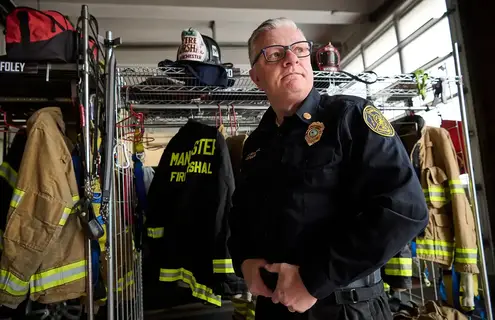
"Your Way Forward" series gives a compelling and intimate view into our patients' worlds. Here, we share this moving "Your Way Forward" story of a fire marshal who overcame cancer.
Peter Lennon, 45, was climbing castles in Scotland with his family and found himself lagging behind. Walking around and being on his feet all day shouldn't have been a problem.
As the Fire Marshal for the City of Manchester, New Hampshire, Lennon keeps active with code enforcement, reviewing plans, public education and fire investigations for every incident in the city. He's held the position for 18 years and serves as a police officer in the neighboring town of Auburn.
For more than a year, Lennon was experiencing fatigue and other symptoms, including restless legs that would keep him up at night. "I just thought it was my age, life over 40," he said. He tried more exercise, cutting out alcohol and taking vitamins, but he still wasn't feeling like himself.
In May 2023, the Local 856 Firefighter Union and the City of Manchester launched the city's first free cancer screening program for the fire department .
Risk and reward
According to the International Association of Fire Fighters (IAFF), firefighters are at a higher risk for cancer than the general population.
Exposure to chemicals, toxins and other carcinogens from clothing, furniture, and flooring puts them at risk, causing 65 percent of line-of-duty deaths each year—highlighting the need for personal protective equipment and thorough decontamination after every fire.
On the first day of the new screening program, almost 200 firefighters and fire officials were shepherded through a low-dose CT lung scan and dermatology screening at Dartmouth Hitchcock Clinics Manchester.
"We figured that somebody was gonna have a positive finding from this. I didn't think it was gonna be me," Lennon said.
Subscribe to the Living Better newsletter
Your trusted resource for reliable and up-to-date health and wellness information in the Northeast. Get it delivered to your inbox every other week.
A grim diagnosis
After the screening, Lennon was sent for a follow-up appointment. While two polyps were removed in-office, Lennon also had a tumor that would require surgery. He was quickly referred to Jeffrey R. Harnsberger, MD, colon and rectal surgeon, Dartmouth Hitchcock Clinics Manchester.
Lennon knew time was of the essence: Harnsberger said that if this wasn't taken care of immediately, the tumor could grow, and he'd only have three or four years to live.
"I don't like to think about it," said Colleen, Lennon's wife. Together, they have an 11- and a 7-year-old daughter, as well as two older daughters from previous marriages.
In addition to Colleen and his daughters, Lennon was also thinking about his father. "He's a very important person in my life," Lennon said. "It was very, very hard to tell him."
A few years back, the family lost Lennon's sister to the opioid crisis. "My father had to bury his daughter. I didn't want to have him bury his son, too," he said.
Finding a way forward
Lennon's surgery took place on a Friday.
In addition to the tumor, Harnsberger removed a foot of colon, around 25 lymph nodes and appendix as an extra precaution. He also spent time on Lennon's spleen.
"The surgery was longer than usual, but more thorough. I do feel very confident that Dr. Harnsberger got everything," Lennon said. The nurses, including Jenna Noone, RN, BSN, were incredible, he said.
Lennon was supposed to be in the hospital for a week. Two days later on Sunday, he was home.
Six weeks later, he had a second homecoming, when he decided to go back to work. His colleagues welcomed him and offered support: with check-ins, rides and heparin shots necessary in post-op care.
"I really wanted to retire when I was ready to retire. Not because of a sickness or injury," he said.
Now, he sees it as his role to be an advocate for preventative care and screenings.
"This program is so important to the fire service," he said. "People are going to be given another chance."
"We're gonna do round two in Scotland this year," Lennon said. He might even climb a castle or two.
Screening and Prevention Programs
When cancers are found early, before they have spread to other parts of the body, they are often easier to treat and have better outcomes. Identifying cancer early can save lives.
At Dartmouth Cancer Center, our healthcare professionals encourage regular cancer screenings. We offer the following services as part of our screening and prevention programs:
- Breast cancer: Our experts recommend regular screening mammograms starting at age 40.
- Colorectal cancer: The American Cancer Society recommends starting screening from age 45–50.
- Skin cancer: See your doctor to ask about moles or birthmarks that have changed in appearance, size or texture.
- Lung cancer: Screenings should start between ages 50 and 80 and are based on smoking history; not all qualify.
- Cervical cancer: Annual pelvic exams are recommended for women over the age of 21.
- Prostate cancer: Men should speak with their doctor about being screened.
Video: Watch Peter's Way Forward


